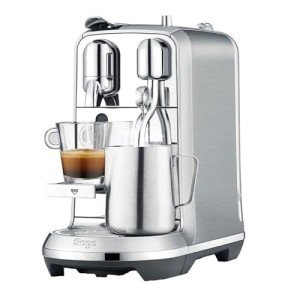20 Things You Need To Be Educated About Home Use Espresso Machines
Home Use Espresso Machines: A Comprehensive Guide
Espresso machines have ended up being a staple in many homes as coffee enthusiasts seek to replicate café-quality brews in the comfort of their kitchen areas. The increase in appeal has led to a varied market filled with different models, features, and prices. This article aims to provide an informative introduction of home use espresso machines, assisting readers browse their choices successfully.
Comprehending Espresso Machines
Espresso machines work by forcing hot water through finely-ground coffee under high pressure, resulting in a concentrated coffee drink known as espresso. There are several types of espresso machines classified based on their developing techniques and level of automation. The most common types consist of:
Manual Espresso Machines: These require the user to manage the pressure and water flow, permitting for a more hands-on coffee-making experience.
Semi-Automatic Espresso Machines: These provide automatic control over water pressure, while the user manually grinds and tamps the coffee.
Automatic Espresso Machines: With the push of a button, these machines immediately control the flow of water, making it much easier to brew espresso with consistent results.
Super-Automatic Espresso Machines: These all-in-one machines deal with grinding, tampering, brewing, and even milk frothing, making them ideal for users searching for benefit.
Capsule or Pod Machines: These use pre-packaged coffee pods to produce espresso with very little effort, but they limit choice in developing strategies and flavors.
Table: Comparison of Espresso Machine Types
Type
Control Level
Reduce of Use
Cleaning Level
Ideal For
Manual
User-controlled
Moderate
High
Coffee perfectionists
Semi-Automatic
Partial automation
Moderate
Moderate
Home baristas
Automatic
Fully automated
Easy
Low
Busy people
Super-Automatic
Fully automated
Really simple
Really low
Convenience hunters
Capsule/Pod
Totally automated
Very simple
Very low
Casual drinkers
Key Features to Consider
When selecting a home use espresso machine, it's important to think about various functions that can considerably impact the quality of espresso and user experience.
Pressure: Look for machines that supply at least 9 bars of pressure, as this is considered optimum for developing espresso.
Boiler Systems: Single vs. dual boiler systems identify temperature stability and the ability to brew espresso and steam milk at the same time.
Grinder: Integrated grinders permit for newly ground coffee, which enhances flavor. Consider machines with adjustable grind settings.
Milk Frother: For those who delight in coffees and lattes, a built-in steam wand or automatic frother is crucial.
Size and Design: Consider your kitchen space and aesthetic choices. Machines come in numerous sizes, from compact to large setups.
Price: Home espresso machines can vary from a few hundred to a number of thousand dollars, so it's vital to develop a budget before exploring choices.
Advantages and disadvantages of Home Use Espresso Machines
Pros
Cons
Convenience of developing coffee in the house
Initial financial investment can be high
Quality of espresso is typically exceptional
Requires some skill, particularly with manual machines
Capability to try out flavors
Upkeep and cleansing can be labor-intensive
Can conserve money in the long run
Not all machines will suit every coffee preference
Maintenance and Cleaning Tips
Preserving an espresso machine is essential for prolonging its life and guaranteeing consistent brew quality. Here are some useful ideas:
Regular Descaling: Minerals from water can develop in the machine. Descale every 1-3 months, depending on water hardness.
Daily Cleaning: Rinse portafilters, baskets, and steam wands after each use to avoid coffee oils from building residue.
Use Filtered Water: This can assist minimize mineral buildup and improve the taste of coffee.
Change Gaskets and Seals: These components might wear in time and should be changed to preserve pressure and performance.
Check out the Manual: Each machine has specific care directions; following these will guarantee longevity.
Frequently Asked Questions About Home Use Espresso Machines
**Q1: What is the best budget espresso machine?The best budget espresso machine often depends upon specific needs, but designs like the DeLonghi EC155 or the Breville Bambino are popular amongst users for offering fantastic value. Q2: How long do home espresso machines generally last?With correct maintenance, home espresso machines can last anywhere from 5 to 15 years, depending upon the quality of the machine and frequency of use. Q3: Can I make coffees and lattes with any espresso machine?While most espresso machines can make cappuccinos and lattes, having a trustworthy
steam wand or frother is necessary for achieving the ideal milk texture.
Q4: Are super-automatic machines worth the investment?For Buy Coffee Maker who focus on benefit and quick developing, super-automatic machines can be worth the investment, though they may do not have some customizability in brew strength and taste. Q5: What types of coffee beans are best for espresso?While personal choice contributes, beans labeled as” espresso “blends are generally roasted darker, creating rich tastes and a creamy texture when brewed.
Purchasing a home espresso machine can transform the daily coffee regimen into something unique, raising home brews to café quality. By comprehending the different types of machines, crucial features to think about, maintenance needs, and weighing the
benefits and drawbacks, consumers can make informed decisions that match their specific preferences. As the espresso culture continues to grow, no matter the option, every brew can be a tasty experience waiting to be savored.  **
**